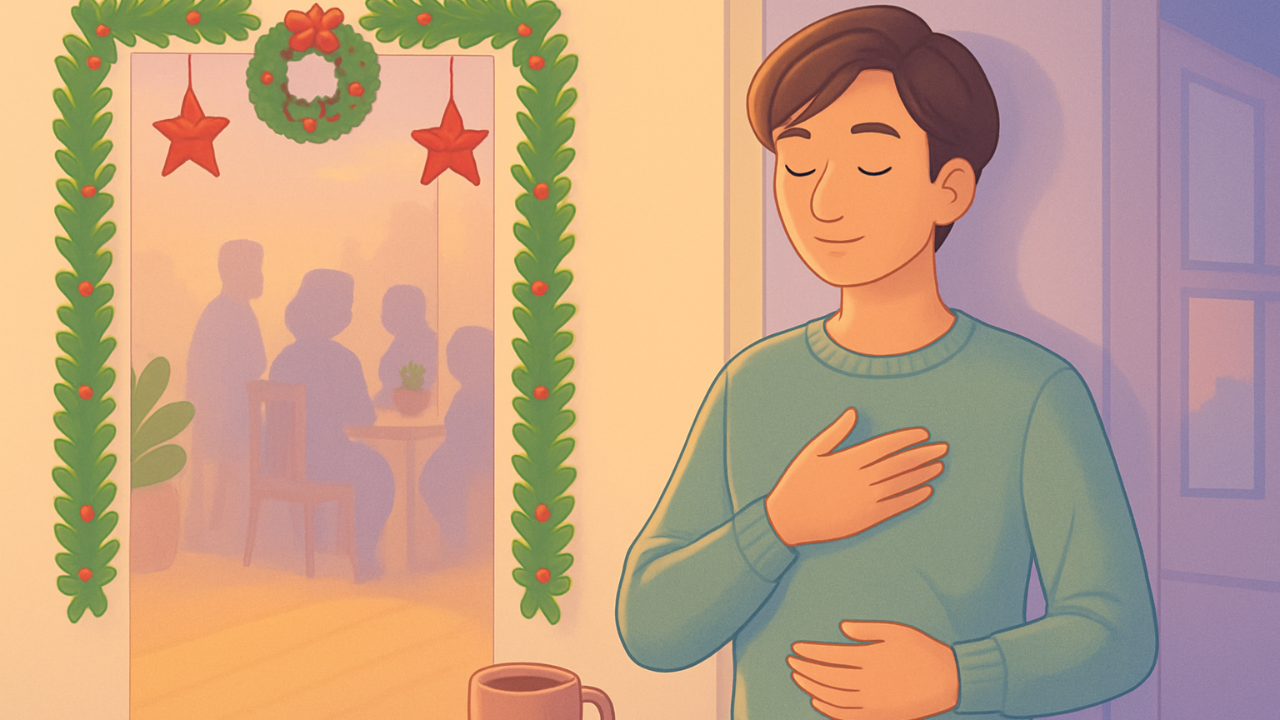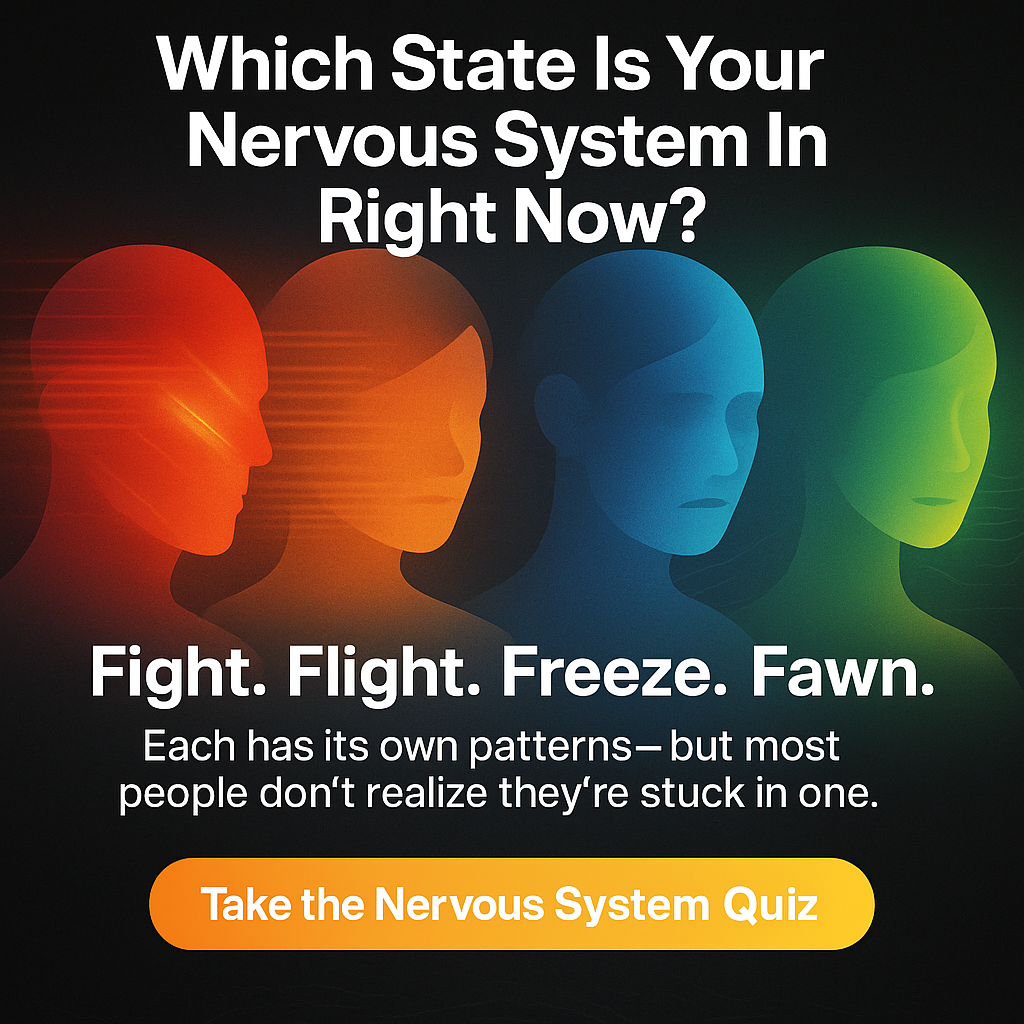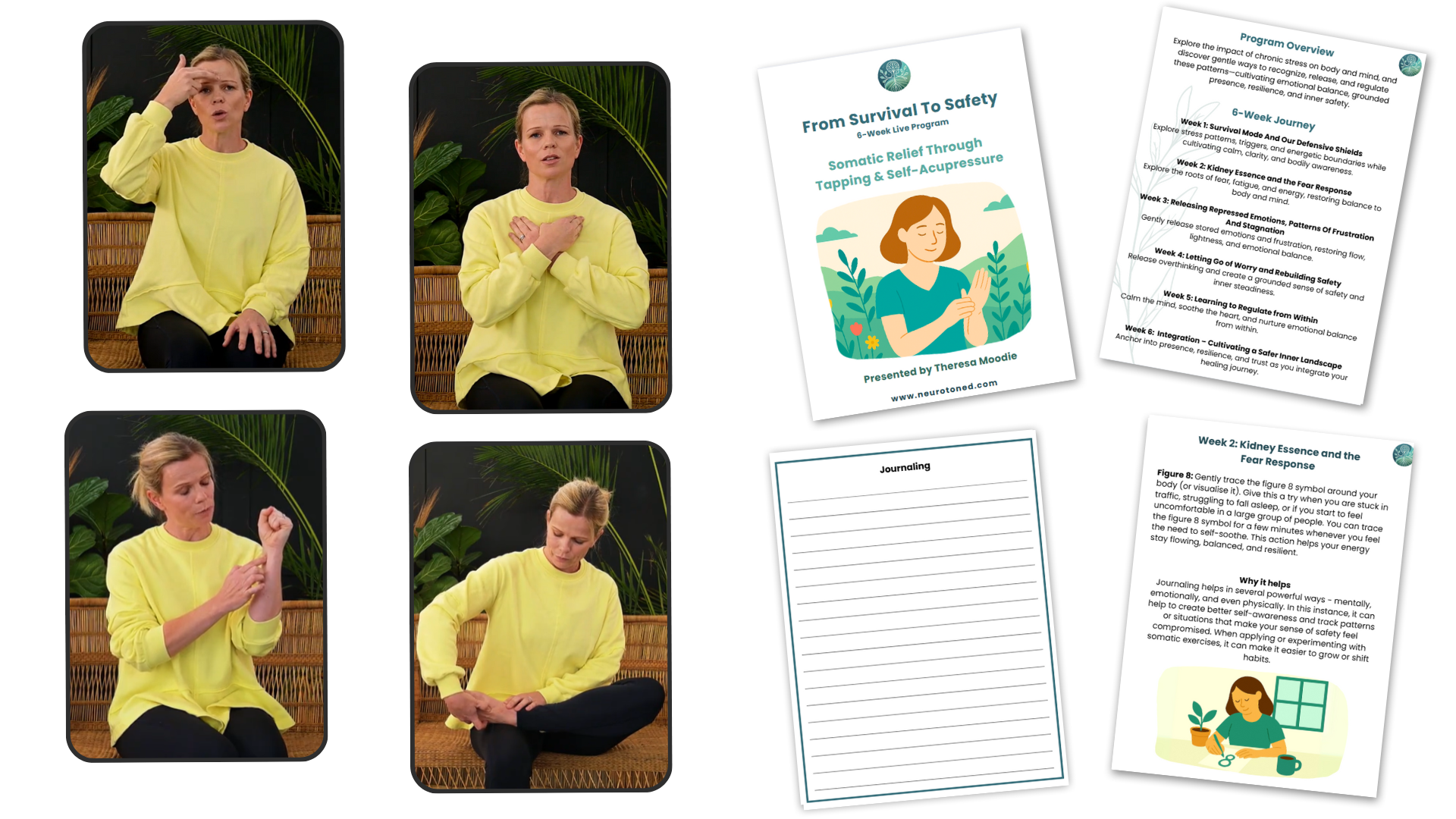
Feel Safe at Family Gatherings: Nervous System Tools That Help
Family gatherings can stir things inside your body long before anyone says a word. Old dynamics wake up. Tones of voice hit familiar bruises. Your system may brace in ways you cannot talk yourself out of. If this happens to you, you are not alone. It is not “overreacting.” It is your body trying to protect you.
If you want simple clarity on why your body reacts this way, the Stress Loop Quiz is a gentle place to start.
Quick Answer
You can feel safer at family gatherings by giving your nervous system tiny cues of safety. Slow, longer exhales. Warm pressure on your chest or belly. Microbreaks to step away and regulate. Gentle orientation to the room. These signals help your body shift out of threat and into presence, even when the environment is familiar but activating.
Why Family Gatherings Trigger Old Survival Patterns
Your body remembers. Even if you have done a lot of healing work, certain voices, postures, or expectations can pull up old survival responses. Many people feel this as being “ready to jump out of my skin,” which is explained gently in Why do I always feel ready to jump out of my skin for no reason?
Family environments can also activate deeply stored patterns of panic or internal alarm. If you are curious why, or why your body spikes even when nothing “bad” is happening, you might like this helpful guide on panic physiology in What Are Panic Attacks? Why Do They Happen? Can I Stop Them?
Your body is always trying to keep you safe. These reactions may be old, but they are intelligent.
For more gentle guidance on saying "no," How to Set Boundaries to Protect Your Nervous System may be a supportive resource.
A Pre-Gathering Regulation Plan
Small preparations can soften the edges before you step inside.
Settle your breath, but in a way that feels safe
If deep breathing makes you anxious, you are not imagining it. Many people feel worse when they inhale deeply. Gentle alternatives in Why Deep Breathing Makes Me More Anxious, And What To Do Instead may help.
Try one slow inhale. Then a much longer exhale. Let your shoulders drop a little.
Orient to safety
Name three neutral things around you.
The sky. A plant. Your hands.
This tells your system, “Right now, I am here, and I am safe enough.”
You can learn more about the practice in Orienting Practice: A Gentle Way to Calm Your Nervous System.
Warm pressure
Place your hand gently on your chest or belly.
Warmth often calms the vagus nerve faster than thoughts do.
If you are anticipating some difficult conversations ahead, How To Regulate Your Nervous System Before Hard Conversations may be a supportive read.
How To Feel Safer Once You’re In the Room
Family gatherings can be layered. You do not need big strategies. You just need small exits into safety.
Choose a quiet anchor
Here are simple anchors you can return to at any moment:
- Press your feet into the floor for two breaths.
- Hold a warm mug for grounding.
- Touch the rim of your cup.
- Rest your hands together softly.
Use microbreaks
Step into another room. Look out a window. Step outside briefly.
Tiny breaks matter, especially if you tend to go into fawn, freeze, or shutdown.
If you’re unsure which state your body enters, the guide in Fight, Flight, Freeze, Fawn: Real-Life Examples and Gentle Exits explains the patterns gently.
Let your body have edges
Even if you do not say a spoken boundary, your body can still have one.
Sit where you can see the door. Hold an object that grounds you.
Stay near people who feel steady, if possible.
If social anxiety is something you are managing, Gentle Vagus Nerve Exercises For Real-Life Social Anxiety can be a supportive resource.
What To Do If You Start Spiraling
When your body spikes, pause the environment instead of pushing through it.
Step away before the overflow
A 30-second break helps your system come back into the present.
Many people find grounding easier when they focus on the physical world around them rather than trying to think their way out. A gentle guide that works anywhere is in Grounding During Panic Without Talk Therapy: A Gentle Guide You Can Use Anywhere.
Warm something
Hold a warm mug. Run warm water over your hands.
Warmth calms the nervous system quickly.
Choose a simple somatic tool
If you tend to go numb, spaced-out, or disconnected during stress, Why Your Body Goes Numb During Stress (and Gentle Somatic Ways to Reconnect) may help you reconnect to your body safely:
If your system gets more fluttery or stomach-heavy, the explanation in Butterflies In Your Stomach: Trauma Or Anxiety? often brings relief.
Give your body small, real-time support. Not pressure.
A Simple 7-Day Preparation Plan
Day 1: Two long exhales each morning. Shoulders soften.
Day 2: Practice a boundary line like, “I’m going to step away for a moment.”
Day 3: Shake your hands gently for 10 seconds.
Day 4: Orient to three neutral things around you (daily).
Day 5: Try a small vagus nerve practice, like a gentle hum or a soft exhale.
Day 6: Plan your microbreak spots.
Day 7: Warm-pressure reset before arriving.
If you want a broader approach to preparing for stressful seasons or emotional density, the gentle guide in A Gentle Nervous System Plan for Holiday Stress is a helpful companion.
Common Sticking Points
“I feel guilt for stepping away.”
Stepping away is not abandoning the moment. It is taking care of your body so you can stay present longer.
“I can’t control the room.”
You do not need to. You only need a few tools that bring you back to yourself.
“I lose my sense of self around certain people.”
This is more common than people admit. If you resonate with this, the piece “I’m Not Worthy To Be Someone’s Friend Because I Don’t Have A Self” may help you understand the deeper pattern.
“I feel exhausted afterward.”
Your nervous system works hard in emotionally dense spaces.
Give yourself rest and warmth afterward.
If you want more clarity on your body’s specific pattern, take the Stress Loop Quiz.
FAQs
What if the overwhelm hits immediately when I walk in?
Pause outside. One long exhale. Touch something steady, like a wall or a doorframe. Then step in slowly.
How do I protect my energy without starting conflict?
Short, gentle statements work well. “I’ll be right back.” “I need a moment.” No explanations needed.
Why do I shut down instead of speak up?
Shutdown is a protective state, not a weakness. It often comes from old relational dynamics.
Supporting yourself with grounding and warm pressure may help.
What if I get panic symptoms in the middle of the room?
Shift your gaze to something neutral. Press your feet down. Take the longer exhale you practiced earlier.
Can nervous system tools replace therapy?
No. These are supportive practices. For medical or trauma concerns, consider speaking with a qualified professional.
Closing
You deserve to feel supported, steady, and safe inside yourself, even when the room is full of people.
If you want to understand the pattern your system gets stuck in during family gatherings, the Stress Loop Quiz is a gentle place to begin.
Disclaimer: This article is educational and not medical advice. If you have health concerns, consider speaking with a qualified professional.
More Gentle Reads
- 5 Simple Somatic Exercises to Feel Safe Again
- A 10-Minute Nervous System Reset For Overwhelm You Can Do Anywhere
- How to Widen Your Window of Tolerance Daily
Discover Your Vagal Tone
Find out how dysregulated your nervous system is and get your personalized roadmap to feeling calm, energized, and in control


